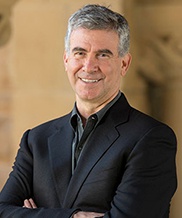Measuring What Matters
 Daniel Schwartz is dean of Stanford Graduate School of Education and an expert in human learning and educational technology. Schwartz oversees a laboratory whose computer-focused developments in science and math instruction permit original research into fundamental questions of learning. He has taught math in rural Kenya, English in south-central Los Angeles, and multiple subjects in Kaltag, Alaska. This diversity of experience informs his work. Among many honors, Schwartz was named Graduate School of Education Teacher of the Year for 2015. His latest book, The ABCs of How We Learn: 26 Scientifically Proven Approaches, How They Work and When to Use Them, distills learning theories into practical solutions for use at home or in the classroom. NPR noted the book among the “best reads” for 2016.
Daniel Schwartz is dean of Stanford Graduate School of Education and an expert in human learning and educational technology. Schwartz oversees a laboratory whose computer-focused developments in science and math instruction permit original research into fundamental questions of learning. He has taught math in rural Kenya, English in south-central Los Angeles, and multiple subjects in Kaltag, Alaska. This diversity of experience informs his work. Among many honors, Schwartz was named Graduate School of Education Teacher of the Year for 2015. His latest book, The ABCs of How We Learn: 26 Scientifically Proven Approaches, How They Work and When to Use Them, distills learning theories into practical solutions for use at home or in the classroom. NPR noted the book among the “best reads” for 2016.
In this talk, Dan looks at how given a dynamic future, it’s important to measure whether and how people choose to learn outside the strict guidance of classrooms. Dan also examines…
1. It is now possible to measure the process of learning, and not only the outcome. This is important because we need people to learn how to learn.
2. People often know lots of good learning strategies. The key question is whether they choose to use them.
3. A core tenant of design thinking is to avoid early closure (e.g., do not commit to one’s first idea). It turns out this is good for learning, and it is possible to teach strategies that students will adopt.